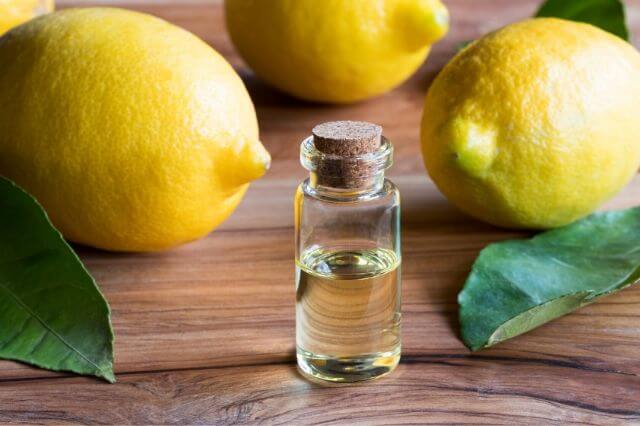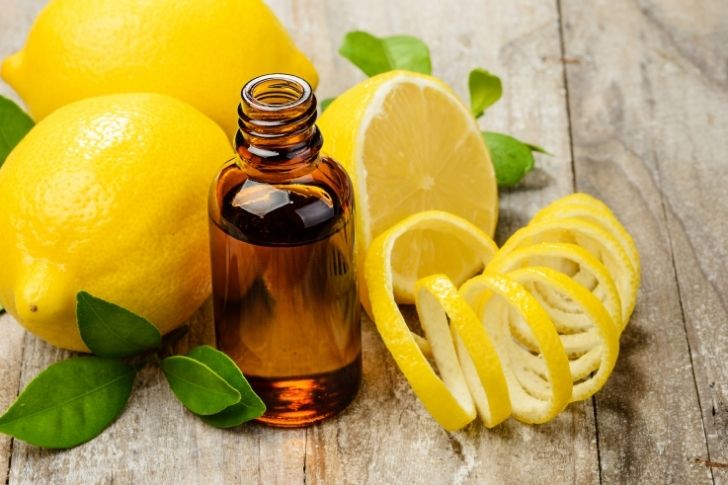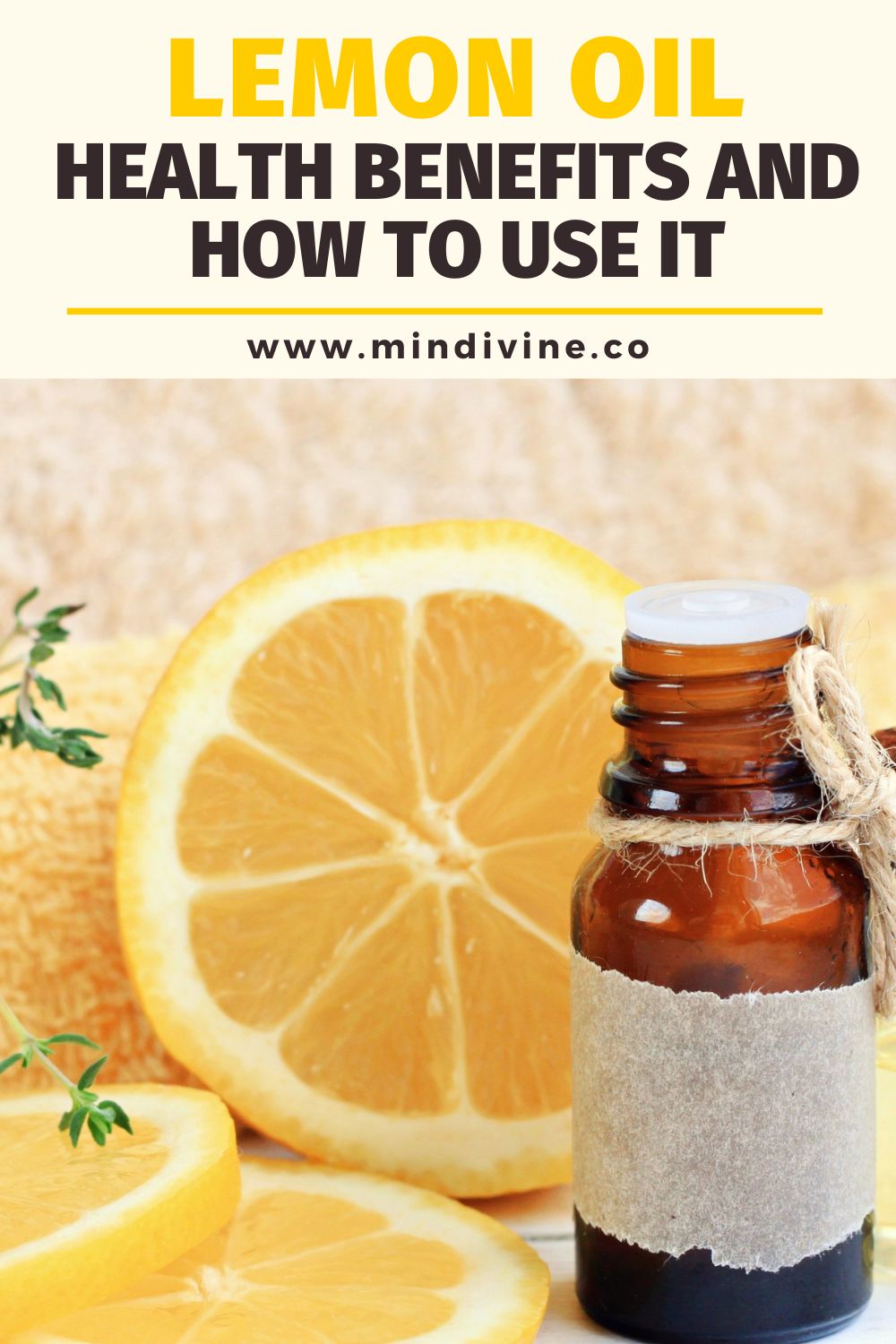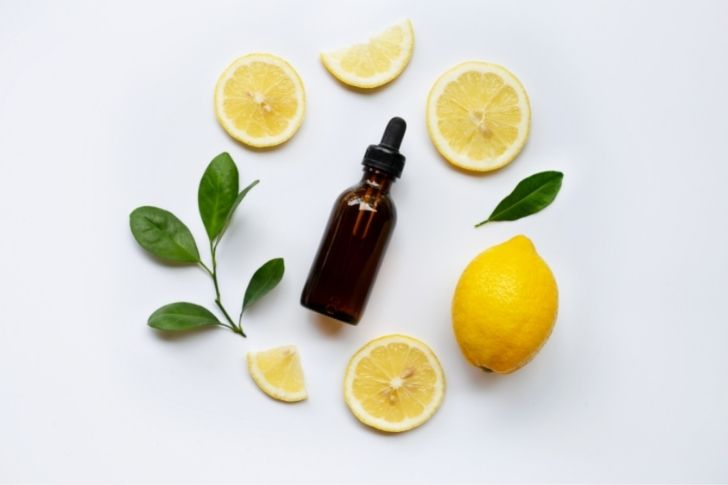The numerous benefits of lemon essential oil make it one of the most excellent and versatile oils in existence, not to mention one of the most widely used. I love its stimulating yet calming aroma, and therefore, it is an oil that I use regularly.
The medicinal benefits of lemon oil are attributed to the fact that it is a rich source of vitamins and minerals. It is a recognized detoxifying agent, antimicrobial, and much more. The fresh, clean smell of lemon essential oil makes it more than just a fragrance for the room. It is a true multitasker. Read on to find out more about this wonderful natural oil.
What is Lemon Essential Oil?
The lemon tree, Citrus limon, is a tree native to Southeast Asia, specifically to areas of China, India, and Burma. It was brought to the Middle East by Arab traders. In fact, the name is derived from the Arabic “laimun” or the Persian “limun.” In the Middle Ages, the Crusaders introduced it to Europe.
It currently grows wild in the Mediterranean region, especially in Spain and Portugal. Although it can be cultivated in all countries, the subtropical regions are very suitable for commercial production, highlighting Spain, Italy, Cyprus, Greece, Israel, China, South Africa, South and North America (California and Florida).
The lemon tree is a small, thorny, evergreen tree with a height of 3 to 6 meters, or approximately 10 – 20 feet. It has shiny, oval, serrated leaves with sweet-smelling, highly perfumed white flowers. Its pale yellow fruit, the lemon, is known for its versatility and has been used for its medicinal benefits all over the world.
Lemons have a fresh and spicy nature. It is the source of citric acid used in food and beverages.
Extraction Methods and Characteristics of Lemon Oil
Lemon essential oil is extracted from the peels of lemons and is rich in vitamins C, E, A, B6, and minerals. This oil is mainly composed of:
- þ)-Limonene
- b-Pinene
- g-Terpinene
- Geranial
- a-Pinene
- Sabinene
- Neral
Although the bark of the fruit is normally used to produce this essential oil, it can also be obtained from its flowers, twigs, and fruit.
The method of oil extraction plays an important role in the chemical and systemic properties of lemon essential oil. Oil extracted from lemon peels can be obtained through two methods, cold expression or steam distillation.
Lemon oil by cold pressure is photosensitive and is used for aromatherapy and cosmetics. Steam-distilled lemon oil is not and is mainly used as a flavoring and aromatizing agent for food, beverages, and perfumes.
Of fine texture, its color can range from pale to intense yellow, or yellow to greenish-yellow, with a light, sweet, fruity, citrus, and fresh smell.
In this post, you will discover everything about lemon oil through cold expression.

Properties of Lemon Essential Oil
The properties of lemon essential oil are as follows:
- Anti-anemic
- Antimicrobial, anthelmintic, immunostimulant
- Antiseptic, anti-febrile
- Anti-inflammatory, anti-rheumatic
- Antioxidant, astringent
- Soothing, stimulating
- Circulatory, hypotensive
- Curative, topical hemostatic, healing
- Depurative, diuretic
- Digestive, antispasmodic, laxative, carminative
- Restorative, tonic
- Disinfectant, insecticide
Uses and Health Benefits of Lemon Essential Oil
Various studies and research demonstrate the multiple qualities, benefits, and uses of lemon essential oil for physical, mental, and emotional health. These are the most prominent:
- Combats skin infections thanks to the effectiveness of the antibacterial, antifungal, and antiviral properties of lemon essential oil.
- It improves oral health because of its antibacterial and antifungal qualities that work as a natural remedy for many oral conditions, including bad breath, mouth sores, and thrush.
- It is effective against candida thanks to its high limonene content.
- It provides effective relief for respiratory conditions such as bronchitis, laryngitis, colds and flu, pneumonia, sore throat, pulmonary colds, asthma, coughs, and pollen allergies.
- It is an excellent remedy for loss of appetite, constipation, indigestion, flatulence and reduces symptoms of nausea and vomiting.
If you are pregnant and suffer from nausea and/or vomiting, consult your doctor before use.
- It helps relieve some symptoms of depression and lifts the mood by modulating dopamine and serotonin activities.
- It acts as a sedative and calms states of stress, being more effective than other essential oils such as lavender oil and rose oil, relieving anxiety and improving mood.
- It significantly improves concentration, attention span, focus, cognitive performance, memory power, and learning ability.
- It stimulates lymphatic circulation by promoting lymphatic drainage, which reduces water retention in the body, promotes weight loss, regenerates tissues, and eliminates toxins.
- Contributes to maintaining a healthy immune system.
- It balances the metabolism by promoting an appropriate response in the body to achieve optimal performance, both mentally and physically.
- It acts on the autoimmune nervous system, is a mild tonic, improves circulation, and helps assimilate essential nutrients.
- It stops weight gain, fat accumulation, and helps you lose weight.
- Relieves tired legs.
Benefits and Cosmetic Uses of Lemon Essential Oil
- Moisturizes, nourishes, and repairs damaged skin.
- Reduces cell and skin tissue damage caused by free radicals.
- It is an anti-wrinkle serum and is rejuvenating thanks to its strong antioxidant activity and anti-aging effects.
- Gives a glow to dull, discolored skin.
- It increases the secretion of sweat and sebaceous glands in very dry and rough skin.
- It can be effective against skin conditions such as blisters, corns, insect bites, cuts, wounds, rosacea, dermatitis, and viral skin infections such as cold sores and warts, among others.
- Promotes circulation and is effective in broken capillaries and couperose.
- As a good astringent, anti-inflammatory, and antibacterial, it can be effective on abscesses, oily skin, and acne.
- It has slightly exfoliating qualities that help remove dead skin cells in your facial cleansing routine.
- Its high content of citric acid helps to even out the pigmentation.
- Lemon oil is a great skin whitener.
- It helps promote healing because it is a great disinfectant, hemostatic, and wound regenerator.
- Promotes the elimination of cellulite.
- Removes excess oil from the skin and improves the complexion, leaving the skin soft and supple.
- Keeps teeth white and healthy.
- It is an effective hair tonic, helps to eliminate dandruff, and relieves seborrheic dermatitis.
- Strengthens hair, reduces hair loss, and gives it shine.
- In hair damaged by dyes and perms, hair resistance is increased.

Home Uses and Benefits of Lemon Essential Oil
- Insect repellent for your skin since insects generally reject the lemon.
- Its excellent lemon aroma will help to refresh your clothes while also cleaning your washing machine.
- Disinfectant for wooden boards, kitchen countertops, and clothes.
- Removes grease and dirt from kitchen utensils and dishes, tools.
- To remove hard-to-remove grease from hands, add to the soap.
- Excellent for polishing furniture and wooden objects, as well as silver.
- Homemade remover of glue and labels from bottles and jars.
How to Use Lemon Essential Oil
Cold-pressed lemon essential oil is mainly used topically and in aromatherapy.
It can be used alone or mixed with other essential oils. Although these oils usually blend well together, lemon oil combines particularly well with oils of lavender, rose, sandalwood, benzoin, eucalyptus, geranium, fennel, juniper, neroli, elemi, chamomile, ylang-ylang, lime, and grapefruit.
Depending on its use, this oil is also diluted in carrier oils (vegetable oils), which is an essential step before use on the skin. The best and most widely used are coconut oil, sweet almond oil, extra virgin olive oil, castor oil, jojoba oil, rosehip oil, and grape seed oil.
To ensure the highest quality in your skin, it is important that your oils are 100% pure organic, or ecological.
Let’s explore the multiple ways that you can use lemon essential oil.
Topical Application
This is one of the most common ways of using lemon oil.
Its topical use is safe as long as you mix it well with a base oil, taking into account the condition you are going to treat and your skin type. If it is oily, you should use a non-comedogenic oil.
Perform a patch test on a small, inconspicuous area of your skin (inside of your elbow) before applying it for the first time. If, after 24 hours, you notice redness or irritation, do not use it.
It has been demonstrated that cold-pressed lemon essential oil is photosensitive, so you should always avoid exposure to ultraviolet light until 24 hours after application. To avoid damage to your skin, make sure you wash it well before exposing it to the sun.
Topical application is useful for both health treatments and cosmetic purposes:
For Conditions and Ailments
- Skin infections or problems: fungus, candida, acne, cellulite
- Respiratory, and digestive conditions.
- To improve blood and lymphatic circulation, the immune system, metabolic function, etc.
For these cases, apply the lemon oil gently to the skin by massaging the area to be treated (circular, ascending, descending) or by rubbing on acupuncture points such as temples, neck, ears, neck, heart, knees, etc.
The frequency of application and the amount will depend on the needs and the ailment to be treated.
In Skin and Hair Beauty
You can add a few drops of lemon essential oil to your face care products, hair care products, or homemade cosmetic recipes, but since it can cause photosensitivity, incorporate it into your daily evening routine.
Since lemon oil can dry out the skin, apply only once a day.
To get all the benefits, use it as a treatment along with a healthy diet rich in fruits and vegetables, and drinking plenty of water.
Studies have shown that lemon oil causes skin sensitization when oxidized. Don’t risk the safety of your skin.
Aromatherapy
The refreshing and light aroma of lemon oil makes it irresistible. But you can go further and enjoy the benefits of this oil for your psychological and physical well-being, through the sense of smell and the absorption of the skin:
- Treat stress, anxiety, and depression.
- Increase calmness and relaxation.
- Relieve muscle and rheumatic pain.
- Nausea, flatulence.
- Mental fatigue, etc.
To get the benefits of aromatherapy, there are several ways to use it.
Dissemination
To diffuse the lemon essential oil, you can use an aromatherapy diffuser or vaporizer.
Put 4 – 5 drops in the diffuser of your choice. Make sure you are in a well-ventilated area and limit your aromatherapy session to 30 minutes.
You can do this both at home and at your workplace.
Direct Inhalation
The essential oil of lemon can be inhaled directly after spraying a drop of it on a handkerchief or soft fabric.
Massages
The aromatherapy massage includes all the benefits of a regular massage (improvement of circulation, lymphatic drainage, etc.) with the additional benefit of lemon oil adapted to your specific needs.
For a massage, mix 20 drops of lemon oil with 1/2 cup of your favorite carrier oil and store it in a tightly closed, dark glass bottle. Shake well to combine the oils and massage the areas to be treated.
Remember that this oil is phototoxic, so you should not expose yourself to the sun until 24 hours after application and clean your skin well.
Bathroom Enhancer
A warm bath alone can relax the muscles and be therapeutic. As an added benefit, lemon oil can also improve your mood and make you feel less fatigued.
At the same time, it acts as a detoxifying agent that nourishes and cleanses the skin while helping with problems such as oil and acne. Its antibacterial properties can also disinfect wounds, and its high vitamin content increases immunity by stimulating the body’s ability to fight harmful bacteria.
To use this oil in your bath, dilute 5 to 10 drops of essential oil in a cup of your favorite carrier oil. Add this mixture to a tub full of warm water, and enjoy your bath.
You can use this method as often as you like, but you must stop it if signs of irritation appear after use.

What Lemon Essential Oil to Buy and Where
The lemon essential oil should always be 100% pure organic or bio, cold-pressed, and therapeutic grade to ensure the best quality and extraction without the use of chemicals.
Check the composition on the label before buying the essential oil.
Widely available for purchase online, lemon oil is sold in many natural product stores and personal care stores. I recommend that you purchase it from a reputable supplier. I buy it from Amazon.
How to Make Lemon Oil
Of course, you can always make your own homemade lemon oil. These are the steps you must follow:
- Peel 5 – 6 washed and dried lemons with a peeler (only the yellow part).
- Put the shells in a clean, airtight glass jar.
- Fill the jar with almond or olive oil until you completely cover all the shells.
- Close the jar, shake the preparation, and put it in a sunny window for two weeks, shaking it every day.
- Then, strain the oil into another airtight glass jar.
- Store the oil in a cool, dark place or the refrigerator for up to one month.
Ready! You can now use your homemade lemon essential oil.
Precautions and Side Effects of Lemon Essential Oil
- The essential oil of lemon is not to be ingested, being only for external use.
- Do not use it in larger quantities than recommended, as it can be harmful. Avoid prolonged use unless used under the guidance of a qualified healthcare professional.
- Not toxic to the skin but may cause sensitization and skin irritation if misused. If you have sensitive or damaged skin, you should avoid using it, even in diluted form.
- Avoid contact with sensitive areas, such as the eyes.
- For topical use, you should always dilute the lemon essential oil in carrier substances as a base or carrier oil. Make a patch test of the oil mixture before using it for the first time and wait 48 hours.
- It is photosensitive even in low dilution, so you should avoid exposure to ultraviolet light for 24 hours after application.
- It is necessary to protect it from oxidation, so you should store it in a dark, dry, cool place and an airtight glass jar.
- Do not use it on children under five years old.
- Consult your doctor before use for pregnant and nursing women, children, the elderly, or if you have medical problems or are taking medication.
- Keep it in a safe place out of reach of children and pets.
- Always use the oil within 10-12 months.
Final Words
Lemon essential oil is a natural product that can have benefits for the mind, body, and beauty. You can apply it to the skin and use it in aromatherapy.
It has a very light, fresh, and sweet smell, being one of the most recognized oils for its refreshing, energizing, and stimulating aroma.
This oil is astringent, antimicrobial, and a skin restorer. It has proven to be very beneficial in the care of the body and skin, keeping it healthy and radiant.
It is revitalizing and stimulating, which helps to keep the mind clear. It is also useful for maintaining a healthy digestive system.
Also, this essential oil is a powerful cleaning agent and a great natural ingredient to use throughout the house.
Remember that even though a product is considered natural, it does not mean that it does not have possible side effects or adverse reactions.
Please note that alternative treatments should not be used as a substitute for medical care. Self-treatment of a condition and avoiding or delaying care by a healthcare professional can have serious consequences.
If you liked this post, please share it. Save THIS PIN below to your Pinterest Essential Oils board and check it later! 🙂


